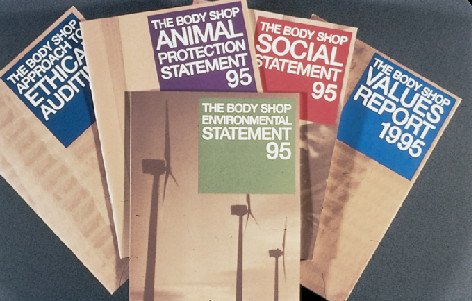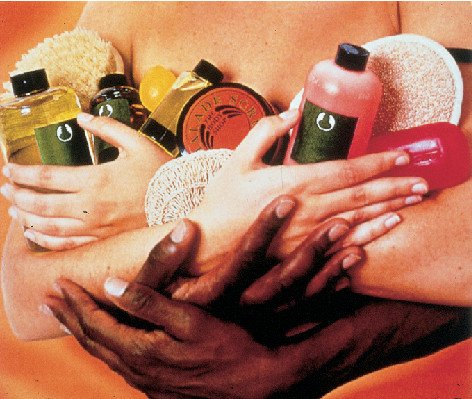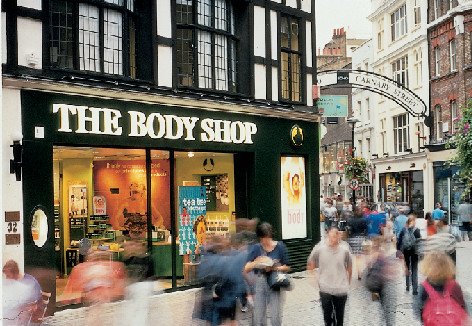This case study focuses on how The Body Shop assesses its own business performance whilst taking into account its different stakeholder groups and their various aims and objectives.
In 1976, Anita Roddick opened the first The Body Shop in Brighton, selling 25 naturally-based skin and hair care products. The Body Shop International Plc now has over 1,500 stores in 47 countries selling over 400 different products. The Body Shop story, however, is not just of a highly successful market-oriented manufacturer and retailer of toiletries and cosmetics. Like its founder, the whole organisation is committed to issues such as respect for human rights and animal and environmental protection. The organisation has arranged and supported national and international campaigns on animal testing in the cosmetic industry, women’s rights, anti-nuclear testing and coordinated an international protest at the sentencing and execution of environmental activist Ken Saro-Wiwa and other Ogoni leaders in Nigeria who were fighting to protect their community from multi-national oil companies. All business organisations need to make a profit to survive but the emphasis at The Body Shop is on profit with a wider social responsibility i.e. ‘profit with principles.’

The Body Shop Mission Statement
To dedicate
our business to the pursuit of social and environmental change.
To creatively
balance the financial and human needs of our stakeholders employees, franchisees, customers, suppliers and shareholders.
To courageously
ensure that our business is ecologically sustainable, meeting the needs of the present without compromising the future.
To meaningfully
contribute to local, national and international communities in which we trade, by adopting a code of conduct which ensures care, honesty, fairness and respect.
To passionately
campaign for the protection of the environment, human and civil rights and against animal testing within the cosmetics and toiletries industry.
To tirelessly
work to narrow the gap between principle and practice, whilst making fun, passion and care part of our daily lives.
Underpinning the Mission Statement is a Trading Charter which addresses the three principal ethical concerns of The Body Shop.
The Body Shop Trading Charter
We aim to achieve
commercial success by meeting our customer’s needs through the provision of high quality, good value products with exceptional service and relevant information which enables customers to make informed and responsible choices.
Our trading relationships of every kind with customers, franchisees and suppliers will be commercially viable, mutually beneficial and based on trust and respect.
Our trading principles reflect our core values.
We aim to ensure
that human and civil rights, as set out in the Universal Declaration of Human Rights, are respected throughout our business activities. We will establish a framework for this declaration to include criteria for workers’ rights embracing a safe, healthy working environment, fair wages, no discrimination on the basis of race, creed, sex or sexual orientation, or physical coercion of any kind.
We will support
long term sustainable relationships with communities in need. We will pay special attention to those minority groups, women and disadvantaged people who are socially and economically marginalised.
We will use
environmentally sustainable resources wherever technically and economically viable. Our purchasing will be based on a system of screening and investigation of the ecological credentials of our finished products, ingredients, packaging and suppliers.
We will promote
animal protection throughout our business activities. We are against animal testing in the cosmetics and toiletries industry. We will not test ingredients or products on animals, nor will we commission others to do so on our behalf. We will use our purchasing power to stop suppliers’ animal testing.
We will institute
appropriate monitoring, auditing and disclosure mechanisms to ensure our accountability and demonstrate our compliance with these principles.
Who are the stakeholders of a company?
Traditional economic theory suggests that the primary reason for a company’s existence is to expand its profitable business. Assessing the company’s performance becomes simply a question of comparing profit levels with forecasts and targets. The owners’ prime objective is to maximise their wealth. The Body Shop, however, has been at the forefront of a growing number of companies who recognise that there are a number of different groups in society with an interest in its performance. These different groups, or stakeholders, may have different priorities. The way the business operates affects them and their expectations may influence the way a company sets its objectives and how it seeks to achieve them.
The Body Shop believes that it should be open and honest in its business dealings and first committed itself in 1991 to an active programme of ethical auditing. This has come to include:
- a social audit
- an environmental audit
- an animal protection audit.
Employees
The Body Shop directly employs 2,500 staff at the Headquarters in Littlehampton and all company-owned facilities and shops in the UK. The employees’ aspirations include job security and diversity, a fair income, promotion and training opportunities. Workers’ rights, including a safe, healthy working atmosphere, fair wage rates and no discrimination on the grounds of race, gender, creed or sexual orientation are set out in The Body Shop Trading Charter. Senior managers must run the organisation in such a way as to satisfy the different groups of stakeholders. This may not be easy and conflicts of interest may develop. Priorities may have to be agreed upon and compromises made. The managers’ jobs may be made harder as the different stakeholders’ objectives may change over time according to how the firm is performing.

Franchisees
The Body Shop is a multi-local business, built on franchising. Although the firm owns a number of shops, 1,300 of the 1,500 outlets are franchised. This has allowed the phenomenal growth rates of the firm over the last 21 years. Franchisees have the benefit of an easily recognised, proven product and brand name, guaranteed supplies, training and advice and the use of the company livery. Franchisees own their businesses and are dependent on them for income. This will, therefore, affect their objectives.
Customers
In the 52 weeks to 28th February 1997, The Body Shop recorded 87 million customer transactions. This means that every 0.4 seconds, someone somewhere buys something from The Body Shop. Customer care therefore has become a crucial part of the trading policy. The Body Shop customers demand not only high quality, value for money products but also recognise the need for environmental responsibility. The customer needs to be well-informed in order to make responsible choices.
Suppliers
The Body Shop has hundreds of suppliers, all of whom have their own stakeholders to satisfy. For smaller suppliers, profits and income may be significant, but also discounts and payment periods may be important. In 1990, The Body Shop introduced the idea of product stewardship which attempts to assess the credentials of ingredient suppliers, giving them a score from 0 to 3 stars based on their commitment to environmental management and auditing, water management and the ecological impact of the ingredients and packaging production. In order to assist the suppliers, The Body Shop has begun to share best practices and benchmarking.

Community trade suppliers
This is a group of 25 suppliers in 13 countries (as of May 1997), such as Brazil, Ghana and Bangladesh, specifically chosen because they are struggling economically. The Body Shop believes that this trade should be more than the simple exchange of goods and currency. It wants to help create livelihoods and explore trade based approaches to supporting sustainable development by sourcing ingredients and accessories directly from socially and economically marginalized producer communities. The emphasis is on long-term trading relationships, seeking to work with the communities rather than exploit them for profit. The Body Shop offers its knowledge, training, creativity and purchasing power in exchange for materials. These communities clearly have a stake in the future success of the organisation.
Shareholders
The Body Shop is a Public Limited Company and its shareholders are the legal owners. Individuals and institutions buy shares in order to make a return on their investment. Although shareholders may recognise the importance of social and environmental issues, the share price remains important. A falling share price can wipe millions of pounds off the value of a company. In theory, if the shareholders are dissatisfied with the performance of the company, they can remove the Board of Directors at the Annual General Meeting.
Local community
Although a firm has many objectives, it is part of a local community and therefore, has a responsibility to the community in which it operates and the local economy. In Littlehampton, for example, a town with unemployment above the national average, The Body Shop is the second largest employer. Job creation is therefore very important to the town. The Body Shop also allows its employees paid time off to do volunteer work in their local community.
Environment/animals
The Body Shop is committed to best practices in environmental management and is against animal testing on cosmetics and toiletries. All groups involved in these issues will be interested to see how The Body Shop performs. Their objectives may be different from other stakeholder groups and their measures of success may conflict.

Methodology
The word ‘audit’ may conjure up images of finance and accountancy, but an audit is simply a method of checking a firm’s progress. How successful has it been compared to its stated objectives? With so many different interested groups, with contrasting aims and objectives, this is not as straightforward as it may appear. As with a financial audit, the first step is to find a suitable, credible independent organisation to verify the audit with its social audience. The Body Shop worked closely with the New Economics Foundation, a UK based think-tank, to design and tailor the audit methodology to The Body Shop.
Problems of methodology
The overriding challenge of stakeholder, or social, auditing is finding a way to measure how people think. Some objectives, targets and performances are reasonably easy to quantify; if, for example, the local community’s objective is to reduce regional unemployment, then new jobs created can be measured. Shareholders’ dividends, employees’ wages or customer complaints are quantifiable, but for many of the objectives, it is impossible to apply tangible measures such as numbers and statistics to intangible human thoughts and emotions. It is also important not to let the voice of one stakeholder drown others. Minority views need to be recognised and therefore the external verifier must ensure that the correct balance is struck. The Body Shop took a year to research, develop and formalise its social auditing procedures and since its adoption in 1994, a great deal of fine tuning has occurred.
How is the social audit conducted?
The audit involves a mix of focus groups, market research-style questionnaires, face-to-face interviews and data collection. The information is collected from each of the stakeholder groups – in all, more than 5,000 people were consulted in the 1995 audit. As with any kind of audit, the true value can only be measured by what follows, so feedback processes and future action plans are critically important. The overriding objective of a stakeholder audit must be to make The Body Shop more efficient, more accountable and more effective. Therefore, the organisation must be completely open and honest and be prepared to acknowledge its failures as well as its successes. External, independent verification is also important if the report is to be a useful policy tool and not merely a marketing ploy.
Stakeholder auditing
Employees
The Body Shop published its first Values Report in January 1996. Inevitably, the report contained both good and bad news:
- 75% of the employees said they were proud to be part of The Body Shop.
- 71% said they enjoyed their job.
- Nearly one in four felt they would have to change companies to develop their careers.
Franchisees
- All the international franchisees sampled agreed that the company takes active steps to make the business more environmentally responsible.
- 91% were satisfied with the communications on environmental management and auditing.
- 35% either had no opinion or disagreed that The Body Shop portrays its business practices accurately to the public.
Customers
The Body Shop scored:
- 9 out of 10 for its ‘Against Animal Testing’ stance.
- 7.8 out of 10 for its commitment to environmental responsibility.
- 7.5 out of 10 for campaigning effectively on human rights, environmental protection and animal protection.
- customer complaints rose from 18.3 per 100,000 in 1992/3 to 20.9 per 100,000 transactions in 1994/5.
Suppliers
- 80% of suppliers recognised prompt payment, clarity of delivery and purchase order requirements and fairness of quality assurance arrangements.
- 20% disagreed or strongly disagreed that The Body Shop’s purchasing and logistics functions are well structured and efficient.
Community Trade Suppliers
Despite a general fit with the Fair Trade Guidelines, a small number of partners, questioned by an independent organisation, were still struggling to be commercially viable in the conventional sense, even though there had been a range of social gains from The Body Shop relationship.
Shareholders
However, from the shareholders’ point of view:
- 90% agreed or strongly agreed that The Body Shop takes active steps to make its business more environmentally responsible.
- only 29% thought that the company enjoyed the trust of the financial community.
- 33% did not think that The Body Shop has a clear, long-term business strategy.
Local community
In 1994/5, The Body Shop staff gave 19,500 hours to projects in the community, but this commitment came from only 25% of the employees. As far as The Body Shop campaigns were concerned, more than 3 million signatures worldwide were collected calling for stricter enforcement of the Convention on International Trade in Endangered Species, but tragically a human rights campaign which started in 1993 failed to prevent the execution of Ken Saro-Wiwa and eight other Ogoni leaders by the Nigerian military government.
The future – an ongoing process
A stakeholder audit must be evaluated on a continuing basis. The analysis of these results enables The Body Shop to plan for the future. For example, there are plans for:
- improved communications and more involvement of franchisees in decision making
- better internal communications with employees
- better indicators for monitoring customer satisfaction
- improvements in communication with and support for suppliers
- establishment of formal trading agreements with Community Trade suppliers and the launch of a six point plan for the encouragement of community volunteering.
For the shareholders, there were promises to adopt a progressive dividend policy and develop and build relationships with shareholders and prospective shareholders. Shareholders’ interests would be maximised while also balancing the needs of other stakeholders. Following the publication of the results of a social audit, it is vital to obtain feedback from stakeholders and engage them in dialogue. This helps shape future audit cycles, enables indicators and data presentation to be fine-tuned for future cycles and helps set priorities for future action by the company.

Conclusion
The Body Shop sets itself very tough standards and has an exceptionally ambitious mission – to dedicate its business to the pursuit of social and environmental change. Measuring how well the company matches up to its ideals has been a huge challenge. Auditing of all forms is a new science and the principles and pitfalls need to be understood. When it comes to such open disclosure, the company can benefit greatly from the negative as well as the positive feedback to improve performance.
